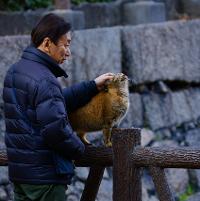A few weeks ago, I went to the cinema to watch the new Japanese movie PLAN 75. The movie recounts an intriguing story about Japan’s rapidly ageing population. With 30% of its population over the age of 65 and with one of the lowest birth rates in the world, Japan is facing unprecedented socio-economic and health challenges. To manage these, in PLAN 75 the Japanese government introduces a program offering those over the age of 75 financial and logistical support for consensual euthanasia.
Are you 75? If so, you may use the state-run program 'PLAN 75' and choose to have yourself euthanised, for your own good and for the benefit of society. Those who sign up for the program receive money to fulfil one last dream; a holiday in a luxury hotel or a free funeral. The movie portrays older adults grappling with the difficult decision of whether or not they want to voluntarily join the program. Those who sign up are given weekly phone calls— strictly cut off after 15-minutes — to discuss concerns regarding their agreement to terminate their lives. Although it is suggested that these conversations are open and explorative, viewers are well aware that the phone operators have been instructed to use the discussion to dissuade older adults from opting out.
The filmmaker, Chie Hayakawa, said that she did not mean to make a movie that is pro or anti assisted suicide or euthanasia. Instead, her movie was intended to be a vehicle to address the issue of a society that offers death, rather than providing ways to help vulnerable people feel less isolated and/or afraid. In this sense, the movie explores the question: should we provide older adults with reasons to live or should we offer them a way to die? It also raises the pressing ethical dilemma of how a society might deal with limited resources: Can providing an assisted death in any way be viewed as a humane solution to this problem? Moreover, by portraying the lived experience of loneliness and the issue of older adults feeling like they no longer matter, the movie poses questions about how they may live a meaningful life until death.
On the one hand, PLAN 75 is an absurdist depiction of a dystopian future based on Japan’s ageing demographic. As such, the film portrays an imagined society in which people—under the banner of free will—are coerced into choosing death through the use of propaganda. On the other hand, PLAN 75 presents its viewers with a sensitive, thought-provoking account that is far less unrealistic than it may at first seem. Hayakawa has stated in an interview that when the film came out in Japan, many online commentators remarked that the program was ‘exactly what their society needed’. In addition, during her research for the project, Hayakawa interviewed 15 older Japanese women, most of whom said they would approve of a policy resembling PLAN 75. For them, the latter was seen as a way of safeguarding themselves from becoming frail, suffering from cognitive decline and other health issues. In this regard, state-sanctioned assisted death could provide a way out for those suffering from intense feelings of redundancy and/or burdensomeness to society and their families, and could prevent them from experiencing lonely deaths.
The film also appears to draw on an age old moral and existential issue reflected in the Japanese tale of Ubasuteyama (ubasute means abandoning a parent). In this tale, according to anthropologist Jason Danely, an older relative is carried to a mountain, or some other remote, desolate place, and left there to die. In its various adaptations, the Ubasute-tale is one of the most common and fundamental narratives about ageing, ageing anxieties, burdensomeness, care, and abandonment in Japanese society. Despite the modern, medical-technological and bureaucratic context of PLAN 75, the film could perhaps be understood as another variation of Ubasuteyama. This is because it reflects the anxieties of a growing number of older adults, uncertain about their place in Japanese society, who seek alternatives to the shame of becoming a burden, as well as highlighting the moral ambivalences that accompany their dying trajectories.
As reflected in recent film reviews in Dutch national newspapers, the movie also provides a somewhat awkward window onto the ongoing Dutch debate on self-chosen deaths. For over 30 years the Dutch have considered whether older adults should have the legal right to engage in assisted dying. This has included my own research on the lived experience of older adults who are tired of life. The findings from this work resonate with PLAN 75’s narrative; such as, some older adults’ senses of loneliness, feelings of not mattering and burdensomeness, their fear of dependence, and wish to terminate their lives.
However, Hayakawa’s film also corresponds to this research through raising important ethical questions about the risks involved in policies such as PLAN 75. The mirror image provided by the film could help to nuance the Dutch debate and assist us in our thinking about the (un)desirability of the proposed policies. For example, the film beautifully demonstrates the complexities involved in freely choosing death. Additionally, it shows how societal pressures play a role in decision making. It also illustrates how further complex issues—that might not be adequately addressed by society—may influence the wish to die. Finally, the film demonstrates what can happen if bureaucracy takes over and people stop questioning the systems affecting their lives. If you have not seen the movie, I can definitely recommend watching it.
About the Author
Els van Wijngaarden is Associate Professor in Contemporary Meanings of Ageing and Dying, Department of Anesthesiology, Pain and Palliative Medicine Radboud University Medical Center, Nijmegen, the Netherlands.
Opinions of the blogger is their own and not endorsed by the Institute
Comments Welcome: We welcome your comments on this or any of the Institute's blog posts. Please feel free to email comments to be posted on your behalf to administrator@ageing.ox.ac.uk or use the Disqus facility linked below.













_square_sm.jpg)